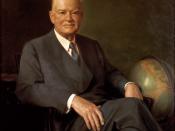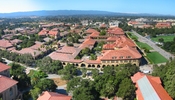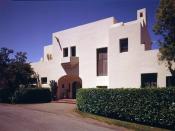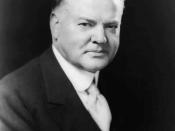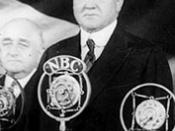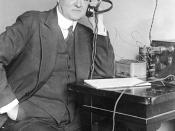Page 1 President Hoover was a very decorated person that gained popularity and admiration in four areas, which included geological engineering, war relief work, politics, and governmental bureaucracy. His highest point of his public career, being elected president, was dominated by the Great Depression just 6 months after his election, which was his biggest disappointment and failure.
Early Life Herbert Clark Hoover was born on August 10, 1874, in the Quaker Village of West Branch, Iowa. He was the son of Quakers, Jesse Hoover, a blacksmith and dealer in farm implements, and Hulda Minthorn Hoover, a teacher. "Bertie"�, as known to his family had and older brother named Theodore and a younger sister named May. All three children became orphans at a very young age. Hoover was only 6yrs. old when his father died of typhoid fever at age 34 and his mother of pneumonia 3yrs. later. All three children were separated and sent to live with their relatives.
On September of 1884 Hoover went to live in Newberg, Oregon under the care of his maternal uncle, Dr. Henry J. Minthorn, a physician and businessman. Hoover attended Friends' Pacific Academy, a Page2 Quaker school founded and conducted by his uncle. Four years later Hoover became employed by a land settlement business in Salem, Oregon also founded by his uncle.
There he served as an office boy for the next two years.
Life's work and Career In 1891, Hoover became the youngest member of the first class to attend Stanford University in Palo Alto, California, were he majored in geology. He worked his way through college, by serving on numerous geological survey teams. In 1895, he graduated from Stanford University with an A.B. degree, and in 1897 he was hired by a British company, for which he was sent to Australia, to mage a gold mine, for two years.
In 1899, he married Lou Henry of Waterloo, Iowa. Hoover and Lou Henry me her freshman year in college at Stanford, were she was also majoring in geology. That same year Herbert and Lou left for China. There were he was offered a program of developing its natural resources. Both became actively involved in the aid of those civilians caught in the Boxer Rebellion (1900), the anti-foreign uprising in China.
In 1901 Hoover became partner with Bewick, Moeing, and Company, were he Page3 spent the next 7 years climbing the latter of success, traveling around the world on business trips as a mining engineer. During this time Hoovers first born, Herbert Clark Hoover Jr. was born in London on August 4, 1903 and his second child Allen Henry on July 17, 1907.
Beginning of his Success By age 34 , Hoover had great wealth and was well known due to his profession as well as interests and chairmanship in mining companies. When World War I began in 1914, Hoover was in Europe were he was involved in relief work helping out those Americans stranded in Europe and organizing an American Relief Committee. This brought him recognition as a public figure and a practical idealist. When the United States entered the war in 1917, President Woodrow Wilson appointed Hoover U.S. Food Administrator making him a, well known, and widely acclaimed war-effort manager.
In 1921, when Warren G. Harding became president, he made Hoover part of his cabinet by appointing him as Secretary of Commerce. Over the next seven years he spent his time concentrating his attack on national economic and social problems. In those Page 4 years newspapers, politicians, and others considered him to be a presidential possibility.
When Calvin Coolidge chose not to run again in 1928, Hoover became the leading Republican candidate.
The Presidency In The election of 1928, Hoover easily defeated his Democratic opponent Alfred E. Smith of New York. His first efforts as president included farm legislation. Hoover passed the Agricultural Marketing Act of 1929, providing for the purchase of surplus farm products. Within 6 months the beginning of the Great Depression sent farm prices to its lows.
The Smoot ""Hawley Tariff Act, signed by Hoover was meant to help out the Great Depression, but only made matters worst. People disliked this and wanted Hoover to veto it. Hoover had little time to initiate a program before the Stock Market Crash on October 29 of 1929 which launched the Great Depression., leaving 12 to 14 million Americans, without jobs. In March of 1930 he assured the nation that everything would soon end. He repeated this over and over to try and restore confidence, but failed. Hoover Page 5 did attempt to provide active leadership to meet emergencies of the Depression. On January 22, 1932 the Reconstruction Finance Corporation, established by Hoover was approved. It provided indirect relief to the unemployed by lending money to stimulate economic activity and employment. However, Hoovers biggest mistake were his actions taken to deal with the Bonus Army, a group of WWI veterans who protested that they redeem their money certificates, which were to be redeemed in 1945. Hoover sent federal troops to evict those by using tear gas and bayonets.
Peace was the basis of Hoovers foreign policy. He opposed joining the League of Nations, but still cooperated with it. On January 7, 1932 the "Stimson doctrine"� was a brought up declaring the U.S. wouldn't recognize territorial conquest. Even better was the Latin American policy, which helped establish the Good Neighbor policy.
Recovery did not come for Hoover, worsening economic crisis during his last six months. Hoover was re-nominated to run for president, but lost to Franklin D. Roosevelt of New York, who dominated the presidential race of 1932 and easily won.
Activities after the Presidency Page 6 After his presidency Hoover settled in Palo Alto, California. He remained active with Republican Party politics and public debates. In 1947, he was once again brought to government by President, Harry S. Truman by appointing him chairman of the Commission on Organization of the Executive Branch of Government commonly called the Hoover Commission. At the age of 80 he chaired a second committee to which he was appointed by, President Dwight D. Eisenhower.
Hoover maintained an impressive schedule of writing and public speaking and frequently airing his views on international and national problems. On his 84th birthday he broke the record of John Adams in surviving beyond his term longer than any other president.
Herbert Clark Hoover died in New York on October 20, 1964, having past his 90th birthday. Despite his failure as a president we are able to remember him for his other successes as being a great "engineer, humanitarian, secretary, and best of all a public servant."�
